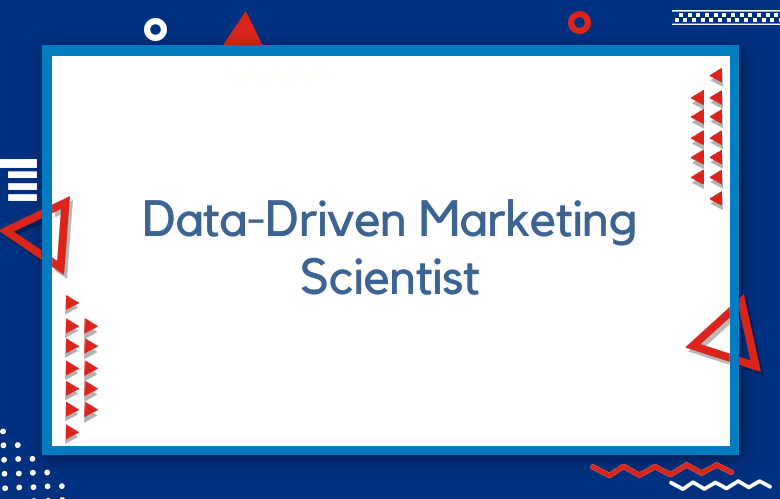Data-Driven Marketing Scientist: Modern Strategies Unveiled

The role of a Data-Driven Marketing Scientist is increasingly becoming pivotal in the contemporary marketing landscape, where leveraging big data and analytics to inform and optimize marketing strategies is no longer just an advantage but a necessity.
This professional melds the rigor of data science with the creativity and insightfulness of marketing to unveil modern strategies that are grounded in empirical evidence and highly responsive to market dynamics and consumer behaviors.
Data-Driven Marketing Scientist: Modern Strategies Unveiled
In this capacity, the Data-Driven Marketing Scientist employs advanced statistical methods, machine learning algorithms, and predictive analytics to dissect vast datasets and derive insights that guide marketing decisions.
Their work is at the heart of strategic marketing initiatives, from segmenting markets and personalizing customer experiences to optimizing campaign performance and predicting future trends.
These professionals unveil modern strategies through a continuous cycle of hypothesis, experimentation, analysis, and refinement. They navigate web analytics, social media interactions, transactional data, and even sensory inputs, turning disparate data points into coherent narratives that drive strategic decisions.
In essence, the Data-Driven Marketing Scientist represents the confluence of data science and marketing disciplines, bringing a level of precision, accountability, and innovation to marketing that aligns with the demands of an increasingly digital, dynamic, and data-rich marketplace.
Their role is not just about understanding what has happened or what is happening but anticipating what will happen, enabling brands to stay ahead in a competitive environment.
- Key Takeaways
- Understanding Marketing Science
- Role of Data in Modern Marketing
- Challenges in Data-Driven Strategies
- Emerging Technologies and Their Impact
- Data Collection and Analysis Techniques
- Enhancing Decision-Making with Data Insights
- Implementing Effective A/B Testing
- Navigating Privacy and Data Ethics
- Continuous Learning and Adaptation in Marketing
- Summary
- Frequently Asked Questions
- What is the significance of data-driven marketing science?
- How does data impact modern marketing practices?
- What are thecriticaly challenges associated with data-driven marketing strategies?
- How do emerging technologies influence data-driven marketing efforts?
- Why is continuous learning crucial for success in data-driven marketing?
In the world of marketing, the role of a data-driven marketing scientist, utilizing experimentation and methodologies, stands out as both innovative and essential. While traditional marketers rely on intuition and experience, these experts in advertising science harness the power of data and methodologies to make informed decisions that drive results for businesses.
By analyzing trends, understanding consumer behavior, and measuring campaign performance, data-driven marketing scientists unlock valuable insights that shape effective strategies and methodologies. This unique blend of creativity and analytical prowess, combined with methodologies, sets them apart in today’s competitive landscape.
Key Takeaways
- Utilize data-driven insights to enhance marketing strategies and decision-making processes.
- Stay updated on emerging technologies to leverage their impact on marketing effectiveness.
- Implement effective A/B testing to optimize campaigns and improve audience engagement.
- Prioritize data privacy and ethical considerations in all marketing practices.
- Embrace continuous learning and adaptation to remain competitive in the evolving marketing landscape.
- Connect data collection techniques with actionable marketing strategies for tangible results.
Understanding Marketing Science
Interdisciplinary Nature
Marketing Science integrates various disciplines, blending business, technology, and analytics to drive marketing efforts effectively, including business advertising campaigns. It combines advertising science with data-driven approaches to enhance marketing strategies.
Required Skills
Professionals in Marketing Science need expertise in statistical modelling, enabling them to analyse data trends and consumer behavior. A deep understanding of marketing strategy is crucial for developing effective campaigns.
Role of Data in Modern Marketing
Universal Nature
Data serves as a universal language for marketers to communicate effectively with their audience. By analyzing customer data, businesses can tailor their marketing campaigns to resonate with specific demographics.
Harnessing the power of data allows marketers to personalize their marketing initiatives, creating targeted strategies that yield higher engagement and conversion rates.
Strategic Vision
Having a strategic vision in data collection and utilization is crucial for successful modern marketing. Marketers need to define clear objectives and key performance indicators (KPIs) to guide their data-driven decisions.
By setting goals and aligning them with actionable insights from collected data, marketers can optimize their marketing campaigns for maximum impact and return on investment.
Informed Decisions
Data plays a pivotal role in enabling marketers to make informed decisions based on concrete evidence rather than assumptions. Through data analysis, marketers can uncover trends, preferences, and behaviors of their target audience.
This valuable information empowers marketers to refine their strategies, allocate resources efficiently, and adapt quickly to changing market dynamics.
Challenges in Data-Driven Strategies
Implementation Hurdles
Data-driven marketing strategies often face challenges in implementation. One common issue is the complexity of integrating various data sources for a comprehensive view.
Lack of opportunities to access relevant and quality data can hinder effective decision-making. Incomplete or inaccurate data can lead to misguided strategies and ineffective campaigns.
Overcoming Data Analysis Obstacles
Organizations must invest in robust analytics tools and skilled professionals to overcome obstacles related to data analysis. Accurate data interpretation can significantly improve campaign performance.
Creating a cohesive data strategy involves aligning goals with available data. This alignment ensures that marketing efforts are targeted toward achieving measurable outcomes.
Impact on Business Outcomes
Ineffective data strategies can have a detrimental impact on business outcomes. Poorly targeted campaigns result in wasted resources and missed opportunities for customer engagement.
Misinterpreting data can lead to erroneous decisions, affecting overall business performance. Understanding the nuances of data analysis is crucial for driving successful marketing initiatives.
Emerging Technologies and Their Impact
AI Revolution
Artificial Intelligence (AI) is transforming data-driven marketing by enhancing decision-making processes through advanced algorithms. Companies utilise AI to analyse vast amounts of consumer data, enabling targeted campaigns for better results.
Machine Learning Advancements
Machine learning empowers marketers to predict consumer behaviour accurately, boosting campaign effectiveness. By leveraging machine learning models, companies can personalize customer experiences and improve engagement rates.
Potential Benefits and Challenges
Benefits
- Enhanced personalization of marketing strategies.
- Improved customer targeting and segmentation.
- Optimized campaign performance and ROI.
Challenges
- Data privacy concerns and regulatory compliance.
- Integration complexities with existing systems.
- Skill gaps in implementing and managing new technologies.
Blockchain Integration
Blockchain technology ensures secure data transactions, enhancing trust between companies and consumers. By providing transparent and immutable records, blockchain fosters a sense of authenticity in marketing efforts.
IoT Implementation
The Internet of Things (IoT) enables real-time data collection from connected devices, offering valuable insights into consumer preferences and behaviors. Marketers leverage IoT to deliver personalized experiences based on individual interactions.
Augmented Reality (AR) Applications
Augmented Reality revolutionizes marketing by creating immersive brand experiences for consumers. Through AR applications, companies engage customers in interactive campaigns, driving brand awareness and loyalty.
Data Collection and Analysis Techniques
Effective Methods
Data collection in marketing involves gathering information from various sources, such as customer interactions, website visits, and social media engagement. This data is analyzed to understand consumer behavior patterns and preferences.
Tools and Technologies
Utilize tools like Google Analytics for tracking website traffic, social media insights for audience demographics, and CRM systems for customer data management. These tools provide valuable insights into consumer behavior.
Importance of Data Quality
Accurate data is crucial for making informed decisions in marketing campaigns. By ensuring data quality, marketers can develop effective strategies based on reliable information.
Enhancing Decision-Making with Data Insights
Data Insights
Data insights play a crucial role in guiding marketing strategies by providing valuable insights from collected information. These insights empower data scientists to make informed decisions based on relevant data, leading to more effective campaigns.
Using data analytics, marketers can identify patterns and trends that influence consumer behaviour, enabling them to tailor their strategies to resonate with the target audience. By leveraging these insights, businesses can achieve an incremental sales lift through targeted and personalized marketing efforts.
Real-World Examples
In the realm of data-driven marketing, companies like Amazon have excelled by harnessing the power of data to drive decision-making. Through sophisticated algorithms and predictive analytics, Amazon analyses customer preferences and purchase history to deliver personalized product recommendations.
Another example is Netflix, which utilises viewer data to recommend content based on individual preferences. By tracking viewing habits and ratings, Netflix enhances user experience through curated suggestions, showcasing the impact of data-driven decisions on customer engagement and satisfaction.
Data Visualization
Data visualization plays a pivotal role in transforming complex datasets into comprehensible narratives. By creating visual representations such as charts, graphs, and dashboards, marketers can effectively communicate information derived from data analysis.
Visual storytelling through infographics or interactive reports simplifies the interpretation of insights, enabling stakeholders to grasp key findings at a glance. This visual representation not only aids in decision-making but also fosters collaboration among teams by presenting actionable insights clearly and concisely.
Implementing Effective A/B Testing
Importance of A/B Testing
A/B testing is crucial for data-driven marketing scientists to evaluate different strategies and determine the most effective ones. This method involves comparing two versions of a webpage or app to see which performs better.
It allows marketers to make evidence-based decisions by collecting data on user interactions with each version. By analyzing this data, they can understand what resonates with their audience and tailor their strategies accordingly.
Best Practices for Implementation
To implement A/B testing effectively, marketers should start by defining clear objectives for the test. They need to identify key metrics to measure success, such as click-through rates or conversion rates.
Next, they should create distinct variations of the webpage or app elements they want to test. These variations should be randomly shown to users to ensure unbiased results.
Once the test is live, it’s essential to monitor the performance closely and analyze the results accurately. Marketers should give tests enough time to gather sufficient data before concluding.
Interpreting A/B Test Results
Interpreting A/B test results requires a thorough analysis of the data collected. Marketers need to look at statistical significance to determine if the differences observed are meaningful or due to chance.
They should also consider other factors that may have influenced the results, such as external events or changes in user behaviour. Drawing accurate conclusions from A/B tests is crucial for making informed decisions in marketing strategies.
Navigating Privacy and Data Ethics
Importance
Data-driven marketing scientists must grasp the significance of privacy and data ethics. Protecting consumer data is crucial for trust-building.
Striking a balance between leveraging data for insights and respecting privacy is essential. Ethical considerations are paramount in today’s digital landscape.
Legal Considerations
Understanding data protection laws like GDPR and CCPA is vital. Compliance with these regulations ensures ethical data-handling practices.
Non-compliance can lead to hefty fines and damage to reputation. Prioritizing legal adherence safeguards both consumers’ rights and the company’s integrity.
Strategies
Implementing robust data anonymization techniques safeguards personal information. This approach balances data utility with individual privacy concerns.
Regular data audits help identify vulnerabilities in data handling processes. Addressing these gaps promptly enhances data security and compliance measures.
Establishing transparent data consent mechanisms fosters trust with consumers. Clearly outlining how data will be used builds a foundation of transparency and accountability.
Continuous Learning and Adaptation in Marketing
Professional Development
Marketing professionals must continuously learn to stay relevant in the dynamic landscape of data-driven marketing. Understanding consumer behavior and advertising trends is crucial for successful campaigns.
Continuous learning opportunities such as workshops, online courses, and industry conferences can enhance skills in analyzing data to drive effective marketing strategies. Keeping abreast of the latest tools and technologies is essential for career progression.
Industry Trends
Staying updated on emerging business practices and innovations is vital for a data-driven marketing scientist. Monitoring changes in consumer preferences helps tailor campaigns for maximum impact.
Engaging with industry publications, attending webinars, and participating in networking events are excellent ways to gain insights into current market dynamics. Leveraging this knowledge can increase one’s success in navigating the customer journey.
Summary
In a world driven by data, understanding marketing science is crucial for success. By embracing data-driven strategies, you can navigate challenges, leverage emerging technologies, and enhance decision-making with valuable insights. Implementing effective A/B testing and prioritising privacy and data ethics will set you apart in the competitive landscape. Continuous learning and adaptation are key to staying relevant and achieving your marketing goals.
Embrace the power of data in your marketing efforts today. Stay informed, adapt to changes swiftly, and always prioritize ethical practices. Your commitment to mastering data-driven marketing will not only drive results but also establish you as a leader in the ever-evolving digital realm.
Call: +91 9848321284
Email: [email protected]
Frequently Asked Questions
What is the significance of data-driven marketing science?
Data-driven marketing science empowers businesses to make informed decisions based on factual insights rather than assumptions. By analyzing data, companies can understand customer behavior, enhance targeting strategies, and improve overall marketing effectiveness.
How does data impact modern marketing practices?
Data plays a pivotal role in modern marketing by enabling personalized campaigns, precise audience segmentation, and performance measurement. Utilizing data effectively can lead to increased ROI, improved customer engagement, and better decision-making processes.
What are the key challenges associated with data-driven marketing strategies, advertising science, methodologies, campaign performance, and customer journey?
Challenges in data-driven strategies include ensuring data accuracy, maintaining data privacy compliance, integrating disparate data sources, and interpreting complex datasets. Overcoming these challenges requires robust analytics tools, skilled professionals, and a strategic approach to handling data.
How do emerging technologies influence data-driven marketing efforts?
Emerging technologies such as AI, machine learning, and automation revolutionize how marketers collect, analyze, and utilise data. These technologies offer advanced predictive capabilities, real-time insights, and streamlined processes that enhance the efficiency and effectiveness of marketing campaigns.
Why is continuous learning crucial for success in data-driven marketing, advertising science, and campaign performance?
Continuous learning is essential in data-driven marketing as it allows marketers to stay updated on industry trends, new technologies, and evolving consumer preferences. By investing in ongoing education and skill development, professionals can adapt to changes swiftly and drive innovation in their marketing strategies.



